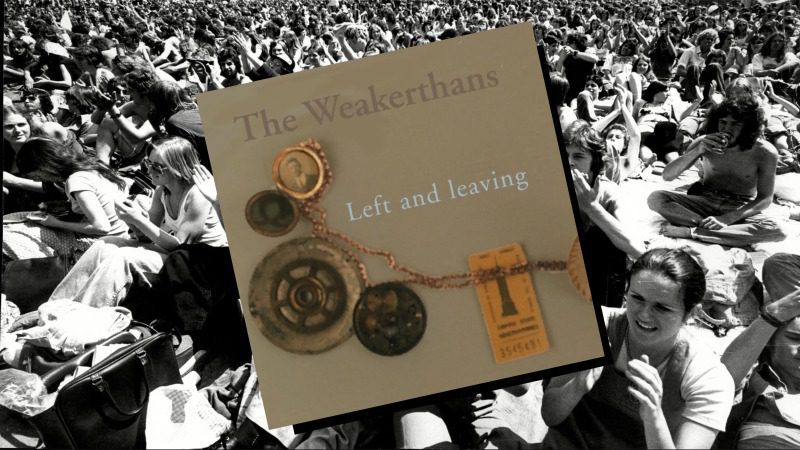Loss has its own grammar. Elizabeth Bishop famously tried to diagram it in “One Art,” attempting to convince herself that “the art of losing isn’t hard to master.” But it is, it always is, and that’s precisely what the Weakerthans’ second studio record catalogues. On Left and Leaving (2000), every chord bends around the same unanswerable question: what do you do with everything that remains after everything is gone—when absence becomes its own kind of presence?
When Left and Leaving found me, I was already deep in the kind of geographic identity crisis that passes for character development in young adulthood. Like every restless kid from a small town, I spent my adolescence staring past the horizon, desperate to be anywhere else. But by the time I discovered the Weakerthans’ sophomore effort, I was packing up my fourth room in nearly as many years, beginning to suspect that maybe the problem wasn’t where I lived so much as the common denominator doing the living (read: me). As I folded my clothes, John K. Samson’s voice echoed out from my Amazon Alexa like an admonishment: “That isn’t change at all / All straight lines circle sometimes.” Still, I left (again), with my life in the rearview mirror and Samson’s wail ringing in my ears: “And I love this place: the enormous sky / And the faces, hands that I’m haunted by / So why can’t I forgive these buildings / These frameworks labeled home?”
People love to call Left and Leaving a coming-of-age record, the kind you listen to while pacing your hometown at dusk and pretending you’re already a ghost there. But to frame the album as merely a “teen angst” record (like some of its emo-oriented descendents) does it a great disservice. It’s a record about growing up only in the sense that growing up means learning to live with what’s gone—to find homes in people and places and then lose them, again and again. So as long as there are, to quote the Alden Nowlan lines used as in the lyric book’s epigraph, “those who belong nowhere / and…those who belong to one place / too much to belong anywhere else,” Left and Leaving will continue to find purchase—to find a home in people unsettled by the absence of one.
That’s part of what makes the record so enduring, even 25 years down the line: it understands geography as biography. Cities become memory palaces, cracked and leaking. The ones you flee, the ones that spit you out; they all leave their fingerprints. Samson treats place the way most songwriters treat heartbreak: as an index of change, a diagnostic tool, a way to measure distance between who you were and who you thought you’d be by now. And there’s always some distance. For all the purgatorial pondering and frozen-window lyrics, the record never confuses stillness with surrender. It’s restless in that specific, painful way self-awareness always is. Even when Samson’s chronicling inertia, there’s motion in it, no matter how small—as he sings on the title track, “My city’s still breathing, but barely, it’s true.”
The city in question—Winnipeg in Manitoba, Canada—is just as much a character on the record as any of the songs’ speakers. Every street corner on Left and Leaving sounds haunted, every skyline slightly off-center, as if Samson’s memories are misaligned with the actual geography. Winnipeg is both muse and punishment: a place that insists on being loved even when it’s trying to freeze you out. Its isolation isn’t incidental; it’s moral terrain. The weather itself seems designed to test conviction—to see who stays, and why. That love-hate tension threads through the Weakerthans’ whole catalogue, eventually exploding into Reconstruction Site’s famously deadpan delivery of “I hate Winnipeg.” But on Left and Leaving in particular, Samson doesn’t just sing about Winnipeg; he triangulates himself against it, mapping the emotional geometry of every streetlight and snowdrift. The album isn’t really about “one great city” so much as the strange intimacy between memory and landscape—how a street can start to look like a photograph of itself, how leaving somewhere can feel like amputating a limb you still expect to move. Winnipeg becomes less a backdrop than a mirror: a reflection that keeps aging even when you’re trying not to.
That’s why opener “Everything Must Go!” plays like a thesis statement. Its premise—a garage sale of emotional detritus meant to “pay [one’s] heart’s outstanding bills”—is brilliant the way Samson’s lyricism so often is: devastating in concept, disarmingly plain in execution. The percussion keeps it tethered to earth, even as the lyrics sift through the attic of a life: “The cutlery and coffee cups I stole from all-night restaurants / A sense of wonder only slightly used.” It’s the sound of someone itemizing heartbreak with a clipboard in hand, practicing grief like inventory management. Each verse is a price tag on something you can’t quite part with. The beauty of Samson’s writing is that he never romanticizes the sadness; he audits it. Every memory here is provisional, negotiable, marked “or best offer.” Everything here will be missed, but it’s going on the table anyway.
Before the Weakerthans, Samson played bass for Propagandhi, one of Canada’s most militant political punk outfits—angry, articulate, and more interested in manifesto than melody. When he left in 1997, he didn’t abandon that fire so much as reframe it. The Weakerthans softened the attack but sharpened the empathy, translating polemic into pop craftsmanship. The guitars chime instead of roar, the tempos breathe, and the protest turns inward—toward loneliness, tenderness, and the quiet labor of still caring. “They’re tearing up streets again, they’re building a new hotel / The mayor’s out killing kids to keep taxes down,” He sings on the gorgeous acoustic number “My Favourite Chords,” “And me and my anger sit folding a paper bird, / letting the curtains turn to beating wings.” It’s not defiance or surrender so much as the quiet after both—the moment when all that’s left to do is name the smoke still hanging in the air.
That tension—between agitation and observation, the collective and the personal—bleeds through Left and Leaving like watercolor. “Pamphleteer” literalizes it, twisting the slogans of socialism into something smaller, lonelier, more intimate. The speaker stands on a street corner, handing out flyers that have long since stopped being calls to action and started reading like love letters to ghosts. Where Marx wrote of “a spectre haunting Europe,” Samson sighs that “a spectre’s haunting Albert Street,” the apparition in question transformed from revolutionary potential to one man’s heartbreak. He even retools the labor anthem “Solidarity Forever,” asking, “Oh, what force on earth could be / Weaker than the feeble strength / Of one like me remembering / The way it could’ve been?” It’s both parody and prayer: radical conviction turned inward, politics swallowed up in empathy.
But that, of course, is because the personal is itself political, and vice versa. Every statistic has a lived reality behind it, and Samson chronicles some of them across the record. “History to the Defeated” imagines a dropout mechanic as a casualty of late capitalism, a working-class martyr whose loss goes unrecorded except in Samson’s verse. “Exiles Among You” sketches a humane, devastating portrait of urban invisibility and “polite society”’s exiling of the impoverished. These songs aren’t protests in the traditional sense; they’re elegies for the people protest forgot.
While the Weakerthans’ soft spot for sentiment was initially quite unfashionable in a scene built on confrontation, by the mid-2000s, they had quietly become one of those bands that other bands cite like scripture. Samson’s way of making politics personal, of treating small griefs as evidence of larger systems, resonated far beyond Winnipeg’s frozen streets. You can hear his fingerprints all over the next generation of songwriters who swapped slogans for self-scrutiny, finding radical potential in tenderness itself—from The Mountain Goats’ hyper-specific empathy to The Hotelier’s diaristic grandiosity to the Midwestern poetics of everyone who’s ever rhymed “coffee” with “lonely.” The Weakerthans were too earnest for punk, too punk for folk, too wordy for either; they existed in that rare middle space where wit and ache coexist. And while emo as a genre label may now conjure visions of eyeliner and Tumblr dashboards, it’s worth remembering that the word is literally shorthand for “emotional.” In that sense, Left and Leaving is emo in its purest form, albeit not in its cultural connotation: the record feels everything, but never asks you to feel bad for it.
“Aside,” the album’s second track, feels like the patient zero of the genre the Weakerthans would go on to influence: a jangly, bittersweet pop song whose opening percussive count-off gives way to something like proto-emo, long before the term became a punchline. “Rely a bit too heavily / On alcohol and irony / Get clobbered on by courtesy / In love with love and lousy poetry,” Samson sings—lines that could just as easily have come from a Modern Baseball record a decade later. Jake Ewald, in fact, once named “My Favourite Chords” as the “perfect song written by somebody else” (officially confirming my long-time suspicion that Modern Baseball’s “Home” shares a direct lineage with “My Favourite Chords”) but it’s “Aside” that most clearly maps the terrain those later bands would traverse: self-deprecation as self-definition, irony and intimacy tangled in the same beer-bottle breath, nasal confession as artform.
That influence was sonic as much as lyrical. The Weakerthans made sincerity sound aerodynamic, smuggling tenderness into arrangements still wired with punk’s urgency. Left and Leaving doesn’t renounce Samson’s hardcore past so much as reimagine it: distortion dialed down to ache, velocity redirected toward empathy. Ian Blurton’s production splits the difference between basement show and barroom ballad, warm enough to feel handmade but sharp enough to catch light. His mix leaves air between the instruments—the dry guitars panned hard left and right, the drums crisp and close—so even at its densest, the record feels lived-in rather than layered. John P. Sutton’s bass provides the ballast—firm, melodic, and quietly narrative, often carrying the songs when Samson’s voice intentionally wavers. Stephen Carroll’s guitars stretch the album’s emotional range, alternating between chiming arpeggios and coarse, windblown distortion. Drummer Jason Tait, the band’s secret weapon, plays with precision that never feels mechanical: his snare is punctuation, his cymbals breath.
Altogether, the record moves like a lung—expanding, contracting, gasping when it has to. “Aside” and “Watermark” take their cues from punk’s downstrokes and tight snares, but they let melancholy sneak in between the beats. “Watermark” especially hums with contradiction, its bright guitar tone barely masking the restlessness underneath, the terror at “how your body still remembers things you told it to forget.” “Exiles Among You” takes that kinetic melancholy to its breaking point, building on a fiery drive that finally gives way to collapse.
On the other end of the spectrum, the slower songs play like the inhale before exertion, the exhale after exhaustion. Opener “Everything Must Go!” opens the record in domesticity, its rhythm section steady but tentative, as if afraid to wake something sleeping, while closer “Slips and Tangles” is a quiet unraveling that returns to the record’s opening inventory and lets it exhale. “Without Mythologies” and “History to the Defeated” strip the arrangements down even further, letting air and reverb do the emotional heavy lifting. It’s a healthy dose of sentiment without ever overdosing on sentimentality.
That distinction between emotion and indulgence is the album’s guiding principle. It’s a balancing act that few songwriters have pulled off with such consistency. Again, you can trace entire family trees of bands trying. (If Left and Leaving is the Old Testament, then Home, Like Noplace Is There and Sports are its Gospels.) Perhaps the difference is that it feels like Samson writes not to be understood but to understand, and that impulse—to look closely, to name things carefully, to catalogue what hurts—is what gives the record its weight. It’s music for people who believe that noticing still counts as an act of grace—that “It’s such an enormous thing to walk and to listen.” All we have is what we observe and what we feel. All else will one day dissipate. “Memory will rust and erode into lists,” Samson sings on the title track. “A blanket, some matches, this pain in my chest / The best parts of lonely.”
If Left and Leaving ends anywhere, it’s not in resolution but in recognition—the slow acceptance that permanence isn’t the same as peace. Samson’s great trick is that he makes impermanence feel inhabited, even hospitable. His songs don’t reach for closure so much as build temporary shelter in the act of noticing itself. It’s what gives the album its peculiar comfort: the sense that even if everything keeps slipping, there’s meaning in the inventory.
By Reconstruction Site, Samson would refine this impulse into a cleaner architecture, using narrative structure as scaffolding and faith as metaphor. But Left and Leaving remains, perhaps, the purer document—the blueprint, albeit without the paintjob. It’s the sound of someone still sketching the edges of a worldview he hasn’t fully learned to articulate, each song another attempt at drawing a map from memory. You can already hear him reaching for the grammar he’d later perfect: the wry humility, the moral imagination, the stubborn belief in mundanity as a form of kindness. Reconstruction Site might be the record that finally names those coordinates, but Left and Leaving is where he first learns how to read them. The album never leaves Winnipeg, yet it manages to contain entire emotional geographies: love, failure, class, faith, art, the quiet violence of self-awareness. It’s not a record about where you are, but about the ongoing act of reconciling yourself to it. And as someone who spent years mistaking motion for meaning, I think that’s why it still levels me. Samson wrote for the in-between—the long layovers between versions of yourself, the years spent learning that restlessness isn’t the same as change.
I’m in my third year of living in the same apartment now, the longest I’ve stayed anywhere since I was 15 and convinced that the act of leaving was a personality trait, and the safest one a person could have. It doesn’t really feel like home—ironically, only my hometown does, in that complicated way Samson both loves and resents Winnipeg—but I’ve learned that nothing ever will if I keep uprooting every time I realize I still feel lost. The art of losing isn’t hard to master, or so they say, but the art of staying might be.
Left and Leaving, though, doesn’t offer redemption for those who stay nor demand penance from those who leave. It merely searches for “Somewhere [where] there’s a box full of replacement parts / to all the tenderness we’ve broken or let rust away / Somewhere [where] sympathy is more than just a way of leaving.’” But I’d argue that the “somewhere” Samson sings of isn’t elsewhere at all—it’s here, in the songs themselves. The record makes a shelter from the ruins it names, turning loss into a livable space, sympathy into a form of endurance, echoes into a kind of company. In the end, Left and Leaving becomes that refuge it seeks—that home for those who belong nowhere and for those who belong to one place too much to belong anywhere else.
Casey Epstein-Gross is Assistant Music Editor at Paste and is based in New York City. Follow her on X (@epsteingross) or email her at [email protected].
[embedded content]




